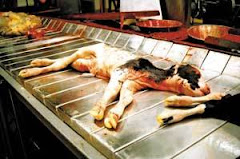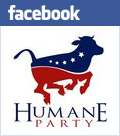FBI Spied on PETA, Greenpeace, Anti-War Activists
'Little or No Basis' for Terror Probes of Animal Rights, Peace Groups, Says Inspector General
By JACK CLOHERTY and JASON RYAN
WASHINGTON, Sept. 20, 2010
The
FBI improperly targeted Greenpeace,
People for the Ethical Treatment of Animals (PETA) and two antiwar groups in domestic terrorism investigations between 2001 and 2006, the Inspector General of the Department of Justice said in a report released today.
The IG found there was "little or no basis" for the terror investigations, and that they were "unreasonable and inconsistent with FBI policy."
At least two of the investigations resulted in innocent people being placed on the domestic terror watch list for years, and one resulted in FBI Director Robert Mueller providing Congress with "inaccurate and misleading information," according to the report.
PETA slammed the FBI for using "McCarthyite tactics."
"PETA's effective activism scare well-heeled business interests that abuse animals," spokeswoman Jane Dollinger said "but when these outfits used their connections to violate the U.S. Constitution, the FBI's ham-handed attempt to catch us with our pants down backfired. As a result, the FBI was caught with
its pants down."
The FBI launched five domestic terror investigations between 2001 and 2006 that were "unreasonable and inconsistent with FBI policy," the inspector general found.
The inspector general, Glenn Fine, is charged with conducting investigations of Justice Department employees and programs.
In addition to Greenpeace and PETA, the FBI targeted the Thomas Merton Center, a Pittsburgh anti-war organization, the Catholic Worker, another anti-war group, and an individual Quaker peace activist, according to the report.
The investigation of PETA began in the FBI's Norfolk, Va., office in the spring of 2001, when one of the group's members was suspected of "providing financial support to members of the Animal Liberation Front and other animal rights extremists to conduct direct actions," such as destroying property or research operations involving animals.
That preliminary investigation mushroomed into a wide-ranging probe of PETA and a number of its affiliate organizations that continued for six years. No criminal activity was ever documented and, the inspector general concluded, the investigation extended beyond the point at which it was justified.
Meanwhile, two individuals under investigation in the case remained on the terrorist travel watch list until 2006.
The investigation of the Merton Center began with a "make work" assignment for a FBI agent on a "slow day," the report said. The agent was dispatched to a November 2002 anti-war rally organized by the Merton Center to look for international terrorism subjects. The agent took a photo of a woman who appeared to be of Middle Eastern descent, the report said, just to have something "to show his supervisor."
Four years later, FBI director Mueller, acting on information provided by his agents, testified to Congress that the surveillance was an "outgrowth of an FBI investigation."
The inspector general found that not to be the case. Indeed, the FBI had "no basis" for the surveillance and it later created two erroneous explanations to justify it, and the subsequent investigation, the report noted.
"It's kind of mind-blowing and perplexing to me that the FBI would target a peace and justice center that focuses on non-violence, in the name of terrorism," said Michael Drohan, president of the board of directors of the Thomas Merton Center. "We hope that this story will strengthen the peace movement."
First Amendment Views Not an Issue
In the case of Greenpeace, the inspector general concluded that the FBI "articulated little or no basis for suspecting a violation of any federal criminal statute."
The investigation was started when the FBI suspected Greenpeace activists might try to disrupt corporate shareholder meetings of two Alaskan energy producers. The protests never happened, yet the FBI kept its investigation open for three years, "beyond the point at which its underlying justification no longer existed," the report concluded.
Mark Floegel, an investigator with Greenpeace, said Greenpeace was "disappointed but not surprised," and that grouping Greenpeace with terrorists was "paranoid and wrongheaded."
"It's nice to know these errors, we hope, are being corrected," Floegel said.
The Catholic Worker was investigated under the "Acts of Terrorism" classification after some of its members trespassed on a military facility and staged a peaceful protest. The inspector general found the classification "inappropriate" and reiterated that the FBI is not authorized to target civil disobedience.
In response to the review, FBI Deputy Director Tim Murphy wrote in a letter to the inspector general, "We are pleased the report concludes the FBI did not target any groups for investigation on the basis of their First Amendment activities.
"As noted in your report '[t]he FBI's investigations of these individuals were generally predicated on concerns about potential criminal acts by these individuals, not their First Amendment views.'
"Additionally," Murphy wrote in a Sept. 14 letter to inspector general Fine, "as described in the report, inaccurate information was provided to the FBI director and Congress regarding the basis for an agents presence at an anti-war rally that was sponsored by the Thomas Merton Center in November 2002. The FBI regrets that incorrect information was provided in this matter."
The inspector general recommended that the FBI determine whether any administrative action was warranted in regard to inaccurate information about the Merton Center surveillance being given to Congress and the public. The report also explored the possibility of revising the FBI?s domestic investigative guidelines that involve collecting information at public events.
The inspector general also recommended that the FBI Inspection Division conduct a review of the Pittsburgh field office case files.










.jpg)














